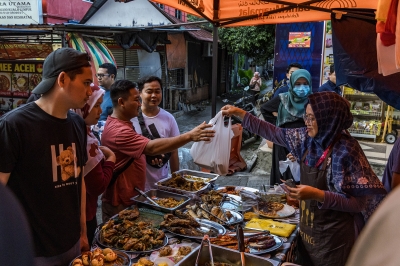MARCH 26 — With the global population now reaching 8.2 billion and climate change posing ever-growing challenges, ensuring daily necessities and human well-being has become increasingly complex. Every day, we hear about shortages of essential supplies and rising prices of raw materials and food products, driven by climate fluctuations and soaring agricultural and production costs.
Yet, whether we realise it or not, advancements in the bioeconomy — powered by biotechnology and bio-based technologies — have been instrumental in addressing these challenges.
In Malaysia, the Malaysian Bioeconomy Development Corporation (Bioeconomy Corporation), under the Ministry of Science, Technology, and Innovation (MOSTI), plays a pivotal role in providing comprehensive support and guidance to the biotechnology and bio-based industries. Through research, development, innovation, and commercialisation, this sector significantly contributes to food security, streamlining processes, and reducing production costs for businesses within the bioeconomy value chain.
At the same time, it also tackles issues of waste and resource management, paving the way for a more sustainable and eco-friendly way of life. Imagine what would happen if biotechnology and bio-based technologies failed to keep pace with population growth, including in Malaysia, where the population has now reached 34 million.
During Ramadan and Syawal, the demand for raw materials for food preparation surges dramatically. Likewise, there is a spike in packaging needs for breaking fast and festive meals, particularly due to the booming trade at Ramadan bazaars. This, in turn, exacerbates waste management challenges, including food wastage. Similar situations arise during other festive seasons.
Overall, Malaysia ranks fourth highest in Southeast Asia in terms of food waste, after Laos, Thailand, and Cambodia, with an estimated 81kg of food wasted per capita annually.
So, how can biotechnology and bio-based technology help address this issue? It does so by converting waste into new resources or transforming it into something valuable, contributing to food security, public well-being, and environmental sustainability.
For example, Black Soldier Fly (BSF) larvae are used to break down organic waste, producing an alternative protein source for the animal feed industry, including poultry and livestock. This sustainable protein then supports the production of festive delicacies such as rendang and satay. Meanwhile, food waste from these meals can be recycled into organic fertilisers or used as feed for BSF larvae, completing a sustainable bioeconomy cycle and reducing overall wastage.
Biofertilisers derived from agricultural waste and beneficial microbes help improve soil fertility, boost crop yields, reduce dependence on chemical fertilisers, and minimise environmental harm. This directly leads to the production of high-quality, healthy food ingredients for festive favourites such as rice for ketupat and lemang, as well as fresh vegetables for traditional dishes like lodeh.
In the industrial bio sector, innovations such as biodegradable plastics and eco-friendly packaging, made from rice straw waste, offer a sustainable alternative for festive kuih packaging. Unlike conventional single-use plastic packaging, these materials naturally decompose, significantly reducing plastic waste in landfills. Similarly, food scraps from festive meals, such as bones, fruit peels, and vegetable trimmings, can be managed through advanced composting technology, turning them into high-quality compost in a short period. This helps cut down landfill waste while promoting sustainable farming by producing organic fertilisers that can be reused for future crops.
From a healthcare bio perspective, consuming postbiotic supplements or probiotic drinks like kefir and kombucha after indulging in rich festive feasts helps improve digestive health. Additionally, bio-based functional foods and beverages, such as moringa drinks and fruit-based cereals, support overall well-being during the festive season.
To maintain a radiant and healthy appearance, bio-based wellness products and dietary supplements, derived from natural sources like pineapple, soursop, and bird’s nest, help keep the skin hydrated, nourished, and glowing throughout the celebrations.
Through the support and guidance of Bioeconomy Corporation, biotechnology and bio-based innovations — developed and commercialised by BioNexus Status companies and businesses under the Bio-based Accelerator (BBA) programme — encourage Malaysians to celebrate in a healthier, more sustainable, and eco-friendly way.
Bioeconomy not only drives economic growth but also encourages a more responsible and sustainable lifestyle, without diminishing the joy of festive celebrations.
In line with the principle of ‘Bioeconomy for All,’ Bioeconomy Corporation, celebrating its 20th anniversary this year, remains committed to strengthening Malaysia’s bioeconomy ecosystem for the well-being of its people and long-term national sustainability. This includes reinforcing strategic collaborations and innovations within the bioeconomy to realise the vision of the National Biotechnology Policy 2.0 (NBP 2.0) — to position Malaysia as a high-tech bio-innovation hub that drives wealth creation, social well-being, and sustainable development.
* Mohd Khairul Fidzal Abdul Razak is the chief executive officer of Malaysian Bioeconomy Development Corporation.
** This is the personal opinion of the writer or publication and does not necessarily represent the views of Malay Mail.





